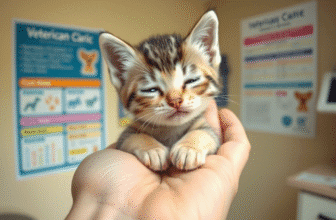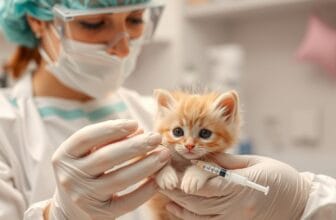
Table of Contents
If you’ve recently noticed your kitten having loose or watery stools, you’re facing a common but concerning issue that many cat parents encounter. Kitten diarrhea can range from a mild, temporary condition to a symptom of something more serious. As a responsible pet owner, understanding why your kitten has diarrhea and knowing how to respond appropriately is crucial for your furry friend’s health and wellbeing.
Young kittens are particularly vulnerable to digestive issues due to their developing immune systems and sensitive gastrointestinal tracts. What might seem like a simple tummy upset can quickly lead to dangerous dehydration and other complications if not addressed properly. This comprehensive guide will help you identify potential causes, implement effective home remedies when appropriate, recognize when veterinary care is needed, and understand preventative measures to keep your kitten’s digestive system healthy.
Whether you’ve just brought home a new kitten or you’re facing this issue with an established feline family member, this article will provide you with the knowledge you need to navigate kitten diarrhea with confidence and ensure your pet receives the proper care.
Common Causes of Kitten Diarrhea
Kitten diarrhea can stem from numerous factors, ranging from simple dietary indiscretions to more serious health conditions. Understanding these potential causes is the first step in addressing your kitten’s digestive distress effectively.
Dietary Causes
Diet Changes
One of the most common triggers of kitten diarrhea is a sudden change in diet. Kittens have sensitive digestive systems that need time to adjust to new foods. When you bring a new kitten home or switch from one food brand to another, the abrupt change can disrupt their intestinal flora, resulting in loose stools.
Dr. Sarah Johnson, a veterinary gastroenterologist at Feline Health Center, explains: “A kitten’s digestive system contains specific bacteria that help break down particular foods. When you suddenly introduce new food, these bacteria haven’t had time to adjust, leading to incomplete digestion and diarrhea.”
Food Intolerances and Allergies
Just like humans, kittens can develop food intolerances or allergies that manifest as digestive upset. Common culprits include:
- Dairy products (many kittens are lactose intolerant)
- Certain protein sources (such as chicken, beef, or fish)
- Grains or fillers in commercial cat foods
- Artificial preservatives or colorings
The reaction to these food components can range from mild loose stools to severe, persistent diarrhea accompanied by other symptoms like vomiting or excessive grooming due to skin irritation.
Low-Quality Food
Poor-quality kitten food often contains fillers, by-products, and artificial additives that can irritate a young cat’s digestive tract. These ingredients offer little nutritional value and can be difficult for kittens to digest properly, resulting in loose or watery stools.

Infectious Causes
Parasites
Internal parasites are extremely common in kittens and represent a significant cause of diarrhea, especially in strays or kittens from environments with poor hygiene. The most common parasites include:
- Roundworms: Often transmitted from mother cats to kittens through milk
- Hookworms: Can cause bloody diarrhea and severe anemia
- Tapeworms: Usually acquired by ingesting infected fleas during grooming
- Coccidia: Single-celled parasites that cause particularly foul-smelling diarrhea
- Giardia: Microscopic parasites that can cause frothy, mucus-filled diarrhea
According to the Cornell Feline Health Center, nearly all kittens are born with some form of internal parasites or acquire them shortly after birth, making regular deworming an essential part of kitten healthcare.
Bacterial Infections
Bacterial pathogens like Salmonella, Campylobacter, and Clostridium can cause severe diarrhea in kittens. These infections often result from:
- Consuming contaminated food or water
- Contact with infected animals
- Poor hygiene in the living environment
- Weakened immune systems allowing opportunistic bacteria to proliferate
Bacterial diarrhea is frequently accompanied by other symptoms such as fever, lethargy, and occasionally blood or mucus in the stool.
Viral Infections
Several viruses can cause diarrhea in kittens, with some being potentially life-threatening:
- Feline Panleukopenia (Feline Distemper): A highly contagious and often fatal disease in unvaccinated kittens that causes severe diarrhea, vomiting, and immune suppression
- Feline Coronavirus: Can cause mild to moderate diarrhea and may, in rare cases, mutate into Feline Infectious Peritonitis (FIP)
- Feline Leukemia Virus (FeLV): Can weaken the immune system, making kittens more susceptible to secondary infections that cause diarrhea
Dr. Michael Davis, a feline infectious disease specialist, emphasizes: “Viral diarrhea in kittens should never be taken lightly, as their small bodies can become critically dehydrated much faster than adult cats. Early intervention is crucial for positive outcomes.”
Other Medical Causes
Stress and Anxiety
Kittens are sensitive creatures, and significant changes in their environment can trigger stress-induced diarrhea. Common stressors include:
- Moving to a new home
- Introduction of new pets or family members
- Changes in routine or environment
- Separation from mother or littermates
The gut-brain connection in cats is strong, and emotional distress can directly impact digestive function, leading to loose stools even in the absence of disease.
Congenital Disorders
Some kittens are born with digestive tract abnormalities or enzyme deficiencies that affect their ability to properly digest food, resulting in chronic diarrhea. These conditions often become apparent when kittens begin transitioning to solid food.
Toxin Exposure
Curious kittens may ingest household plants, cleaning products, or other toxic substances that irritate their digestive tract. Common toxins that cause diarrhea in kittens include:
- Lilies and other toxic plants
- Essential oils
- Household cleaners
- Human medications
- Fertilizers or pesticides
Recognizing Symptoms and Assessing Severity

Understanding the characteristics of your kitten’s diarrhea can provide valuable information about the underlying cause and help you determine how urgently veterinary care is needed.
Types of Diarrhea in Kittens
Acute vs. Chronic Diarrhea
Acute diarrhea comes on suddenly and typically lasts less than a week. It’s often caused by dietary indiscretions, sudden food changes, or short-term infections.
Chronic diarrhea persists for more than 2-3 weeks or occurs in recurring episodes. This type usually indicates more serious underlying conditions like inflammatory bowel disease, food allergies, or chronic infections.
Small Intestinal vs. Large Intestinal Diarrhea
Veterinarians categorize diarrhea based on which part of the intestinal tract is affected:
Small intestinal diarrhea typically features:
- Large volumes of watery stool
- Increased frequency (2-3 times normal)
- Sometimes orange-tinged or fatty-looking
- Often accompanied by weight loss and vomiting
Large intestinal diarrhea (colitis) typically features:
- Small, frequent bowel movements
- Straining to defecate
- Mucus or fresh blood in stool
- Increased urgency
Warning Signs Requiring Immediate Veterinary Attention
Certain symptoms accompanying diarrhea indicate a medical emergency. Seek immediate veterinary care if your kitten displays any of the following:
- Blood in the stool (especially bright red blood)
- Black, tarry stools (indicating digested blood)
- Severe lethargy or weakness
- Refusal to eat for more than 12 hours
- Signs of dehydration (dry gums, skin tenting, sunken eyes)
- Vomiting combined with diarrhea
- Pale gums
- Distended or painful abdomen
- Fever (above 103°F or 39.4°C)
- Kittens under 8 weeks with any diarrhea
Dr. Lisa Thompson, emergency veterinarian at City Pet Hospital, warns: “Kittens, especially those under 12 weeks of age, can become dangerously dehydrated within 24 hours of developing severe diarrhea. Never adopt a ‘wait and see’ approach with very young kittens showing these symptoms.”
Assessing Dehydration
Dehydration is one of the most dangerous complications of diarrhea in kittens. You can assess your kitten’s hydration status by:
- Skin elasticity test: Gently pinch the skin over your kitten’s shoulders. If it doesn’t snap back immediately, your kitten may be dehydrated.
- Gum check: Press your finger against your kitten’s gums until they turn white, then remove pressure. The color should return immediately. Slow capillary refill (more than 2 seconds) suggests dehydration.
- Sunken eyes: Eyes appearing sunken into their sockets indicate significant dehydration.
- Lethargy: A normally active kitten becoming unusually quiet or lethargic may be experiencing dehydration.
Diagnosis: What to Expect at the Vet
If your kitten’s diarrhea is severe, persistent, or accompanied by other concerning symptoms, veterinary diagnosis is essential for effective treatment.
Initial Examination
Your veterinarian will begin with a thorough physical examination and medical history. Be prepared to answer questions about:
- When the diarrhea started and how frequently it occurs
- The appearance and consistency of the stool
- Recent diet changes or possible access to unusual foods
- Exposure to other animals
- Vaccination and deworming history
- Any medications your kitten is taking
- Other symptoms you’ve observed (vomiting, lethargy, appetite changes)
Diagnostic Tests
Depending on your kitten’s symptoms and examination findings, your veterinarian may recommend various diagnostic tests:

Fecal Analysis
This is often the first test performed for kittens with diarrhea:
- Direct smear: Examines fresh stool for parasites, bacterial overgrowth, and inflammatory cells
- Fecal flotation: Helps identify parasite eggs that may not be visible on direct smear
- Giardia testing: Specific tests for this common parasite
- Fecal culture: Identifies pathogenic bacteria
Blood Tests
Blood work provides crucial information about your kitten’s overall health:
- Complete Blood Count (CBC): Checks for signs of infection, anemia, or inflammation
- Chemistry panel: Evaluates organ function and electrolyte levels
- Specific viral tests: For conditions like FeLV or FIV if suspected
Advanced Diagnostics
For persistent or recurrent cases, your veterinarian might recommend:
- Abdominal ultrasound: To visualize the intestinal tract and other abdominal organs
- Radiographs (X-rays): To check for obstructions or abnormalities
- Endoscopy: Allows direct visualization of the digestive tract and collection of tissue samples
- Food trials: Systematic testing of different diets to identify food sensitivities
Treatment Options for Kitten Diarrhea
Treatment approaches vary widely depending on the underlying cause of your kitten’s diarrhea. From home remedies for mild cases to intensive veterinary interventions for serious conditions, understanding your options is essential.
When Home Treatment Is Appropriate
Mild cases of diarrhea in otherwise healthy kittens over 12 weeks old can often be managed at home, especially if:
- The kitten remains active and alert
- Appetite remains good
- No vomiting is present
- The diarrhea is not bloody or black
- The kitten is well-hydrated
- The diarrhea has lasted less than 24-48 hours
Home Care Strategies
Dietary Management
- Fasting (for kittens over 12 weeks only): A short 12-hour fast may allow the digestive tract to rest. Never fast younger kittens, as they need regular nutrition.
- Bland Diet: After fasting or for younger kittens, introduce a bland diet such as:
- Boiled plain chicken (shredded) mixed with plain cooked white rice
- Commercially available prescription gastrointestinal diets
- Small, frequent meals (4-6 per day) rather than larger meals
- Gradual Transition: Once the diarrhea resolves, gradually transition back to regular food over 3-5 days by mixing increasing amounts of regular food with the bland diet.
Hydration Support
Maintaining proper hydration is critical when your kitten has diarrhea:
- Fresh water: Ensure clean, fresh water is always available
- Wet food: Increase moisture intake by feeding wet food
- Kitten milk replacer: For very young kittens, properly mixed kitten milk replacer can provide both hydration and nutrition
- Unflavored Pedialyte: In moderate cases, can help replace electrolytes (consult your vet first)
Veterinary nutritionist Dr. Elizabeth Carter notes: “While adult cats can tolerate some level of dehydration, kittens have minimal reserves. Maintaining hydration is absolutely critical during episodes of diarrhea and may require more proactive measures than simply providing water.”
Veterinary Treatments
For moderate to severe cases, your veterinarian may recommend:
Parasite Treatment
If parasites are detected or suspected, appropriate dewormers will be prescribed. Common medications include:
- Pyrantel pamoate for roundworms
- Praziquantel for tapeworms
- Fenbendazole for multiple parasites including Giardia
- Sulfadimethoxine for coccidia
Antibiotics
For bacterial infections, antibiotics may be prescribed. However, veterinarians are increasingly cautious about antibiotic use to avoid disrupting beneficial gut bacteria unless absolutely necessary.
Probiotics and Intestinal Protectants
These supplements help restore healthy gut flora and soothe inflamed intestines:
- Probiotics: Beneficial bacteria that help normalize intestinal function
- Prebiotics: Compounds that feed beneficial bacteria
- Kaolin-pectin compounds: Absorb toxins and soothe the intestinal lining
- Slippery elm: A natural remedy that coats and soothes the intestinal lining
Fluid Therapy
For dehydrated kittens, fluid therapy is crucial:
- Subcutaneous fluids: Administered under the skin for mild to moderate dehydration
- Intravenous (IV) fluids: For severe dehydration, requiring hospitalization
Medications for Specific Conditions
Depending on the diagnosis, your veterinarian may prescribe:
- Anti-inflammatory medications for inflammatory bowel conditions
- Immunosuppressive drugs for immune-mediated conditions
- Motility modifiers (used cautiously and only under veterinary supervision)
- Specialized prescription diets
Preventing Kitten Diarrhea

Prevention is always preferable to treatment. Implementing these strategies can help keep your kitten’s digestive system healthy and functioning properly.
Dietary Guidelines
Proper Feeding Practices
- Consistent diet: Avoid frequent food changes; introduce new foods gradually over 7-10 days
- Age-appropriate nutrition: Feed kitten-specific formulas until at least 12 months of age
- Quality food: Choose high-quality kitten foods with animal proteins as primary ingredients
- Feeding schedule: Establish regular meal times rather than free-feeding, especially for kittens prone to digestive issues
- Portion control: Overfeeding can lead to digestive upset; follow feeding guidelines adjusted for your kitten’s individual needs
Foods to Avoid
To prevent digestive issues, avoid giving your kitten:
- Cow’s milk and dairy products
- Table scraps, especially fatty or spicy foods
- Raw meat or eggs (risk of bacterial contamination)
- Bones (choking hazard and intestinal damage)
- Human treats like chocolate, onions, and garlic (toxic to cats)
Parasite Prevention
Implementing a comprehensive parasite prevention program is essential for all kittens:
- Regular deworming: Follow your veterinarian’s recommended schedule, typically:
- Every 2 weeks from 2-8 weeks of age
- Monthly from 8-16 weeks
- Then every 1-3 months depending on lifestyle and exposure risk
- Flea control: Since fleas can transmit tapeworms, maintain appropriate flea prevention
- Clean environment: Regular litter box cleaning and disinfection
- Fecal testing: Routine screening, especially for outdoor or multi-cat households
Vaccination and Health Maintenance
Protecting your kitten from infectious diseases that cause diarrhea includes:
- Core vaccinations: Follow your veterinarian’s recommended vaccination schedule
- Regular check-ups: Early detection of health issues before they cause digestive problems
- Quarantine new pets: Keep new cats separate for 2 weeks before introducing them to resident pets
- Minimize stress: Create a stable environment with consistent routines
Veterinary preventative care specialist Dr. Robert Wilson emphasizes: “Many of the viral causes of kitten diarrhea are preventable through proper vaccination. The small investment in preventative care can save both heartache and significant expense down the road.”
Long-term Management for Chronic Cases
Some kittens may have ongoing digestive sensitivities that require long-term management strategies.
Special Diets
For kittens with food sensitivities or chronic digestive issues, veterinarians may recommend:
- Limited ingredient diets: Containing single protein and carbohydrate sources
- Hydrolyzed protein diets: Where proteins are broken down to reduce allergenic properties
- Highly digestible prescription formulas: Specifically designed for sensitive digestion
- Fiber-supplemented diets: For certain types of digestive disorders
Environmental and Behavioral Modifications
For stress-related digestive issues:
- Consistent routine: Maintain regular feeding, playing, and sleeping schedules
- Multiple resources: Provide several feeding stations and litter boxes in multi-cat homes
- Vertical space: Cat trees and shelves allow for stress-relieving options
- Feline pheromones: Products like Feliway can help reduce anxiety
- Interactive play: Regular play sessions help reduce stress and strengthen the bond with your kitten
Monitoring and Follow-up
For kittens with chronic digestive issues:
- Stool diary: Track consistency, frequency, and any associated symptoms
- Regular weigh-ins: Monitor growth and weight gain
- Follow-up testing: Periodic reassessment of parasite status or other conditions
- Medication adjustments: Working with your veterinarian to find optimal dosing for maintenance medications
Conclusion: Ensuring Your Kitten’s Digestive Health
Dealing with kitten diarrhea can be concerning, but with proper understanding of causes, symptoms, and treatment options, most cases can be successfully managed. Remember that young kittens are particularly vulnerable to the effects of diarrhea, making prompt attention essential.
The key takeaways for any cat parent facing kitten diarrhea include:
- Monitor your kitten closely and seek veterinary care promptly if warning signs appear
- Don’t attempt home treatment for very young kittens (under 8 weeks) with diarrhea
- Prevention through proper nutrition, parasite control, and stress reduction is the best approach
- Work closely with your veterinarian to develop both immediate treatment and long-term management plans
By being attentive to your kitten’s digestive health from the beginning, you’re setting the foundation for a lifetime of wellbeing for your feline companion. The effort you invest now in understanding and addressing digestive issues will contribute significantly to your kitten’s growth, development, and quality of life.
If you have concerns about your kitten’s digestive health, don’t hesitate to consult with your veterinarian. Early intervention often leads to quicker resolution and prevents more serious complications from developing.
Frequently Asked Questions About Kitten Diarrhea
How can I tell if my kitten’s diarrhea is serious?
Diarrhea in kittens should be considered serious if it is accompanied by any of these warning signs: blood in the stool, severe lethargy, refusal to eat for more than 12 hours, vomiting, fever, or signs of dehydration (dry gums, skin tenting, sunken eyes). Additionally, any diarrhea in kittens under 8 weeks old should be treated as potentially serious due to their vulnerability to dehydration. The color of the stool can also provide clues – black, tarry stools indicate digested blood from the upper intestinal tract, while bright red blood suggests lower intestinal bleeding. If the diarrhea persists for more than 24-48 hours even without these additional symptoms, it’s still advisable to consult your veterinarian as prolonged diarrhea can lead to dangerous electrolyte imbalances and dehydration.
Can I give my kitten human anti-diarrhea medication?
No, you should never give your kitten human anti-diarrhea medications without veterinary guidance. Products containing loperamide (Imodium), bismuth subsalicylate (Pepto-Bismol), or other human anti-diarrheal ingredients can be toxic to cats and particularly dangerous for kittens. Cats metabolize drugs differently than humans, and their smaller body size makes proper dosing extremely difficult. Additionally, these medications can mask symptoms of serious underlying conditions that require specific treatment. If your kitten has diarrhea, it’s much safer to consult with your veterinarian who can recommend appropriate treatments specifically formulated for feline patients. In mild cases, dietary adjustments and proper hydration are often more effective and safer approaches than medication.
How long does it take for kitten diarrhea to resolve?
The timeline for resolution of kitten diarrhea varies greatly depending on the underlying cause. For simple dietary indiscretions or mild stress-related diarrhea, improvement often begins within 24-48 hours of appropriate management (such as dietary changes or removing the stressor). Parasite-related diarrhea typically starts improving within 2-5 days after beginning appropriate deworming medication. Bacterial or viral infections may take longer to resolve, often 5-14 days, depending on severity and treatment. Chronic conditions like food allergies or inflammatory bowel disease require ongoing management and may show gradual improvement over weeks once an appropriate treatment plan is implemented. If your kitten’s diarrhea isn’t showing any improvement after 2-3 days of treatment, or if it initially improves but then returns, you should consult your veterinarian for reassessment.
What should I feed my kitten with diarrhea?
For kittens with diarrhea, a temporary bland diet can help soothe the digestive tract. Good options include plain boiled chicken (shredded) mixed with plain white rice in a 1:2 ratio, or commercially available prescription gastrointestinal diets recommended by your veterinarian. Feed small, frequent meals (4-6 times daily) rather than larger meals. For kittens under 8 weeks who are still being weaned, consult your veterinarian immediately, as they may need special electrolyte solutions or diluted kitten milk replacer. Once the diarrhea resolves, gradually transition back to regular kitten food over 3-5 days by mixing increasing amounts of regular food with the bland diet. Avoid dairy products, fatty foods, and treats during recovery. Some veterinarians also recommend adding a small amount of canned pumpkin (plain, not pie filling) to food, as the soluble fiber can help firm up stools naturally.
Can parasites from my kitten’s diarrhea infect humans?
Yes, some intestinal parasites that cause diarrhea in kittens can be transmitted to humans, a condition known as zoonotic infection. Roundworms, hookworms, and Giardia are among the most common parasites that can spread from cats to people. Children, pregnant women, elderly individuals, and those with compromised immune systems are at higher risk for serious complications from these infections. To protect yourself while caring for a kitten with diarrhea: always wash hands thoroughly after handling the kitten or cleaning the litter box, wear gloves when cleaning up fecal matter, disinfect contaminated surfaces, change litter frequently, and keep the litter box away from food preparation areas. Regular deworming of your kitten according to your veterinarian’s recommendations is also essential for preventing both feline parasitic infections and potential human exposure.
How can I prevent dehydration in my kitten with diarrhea?
Preventing dehydration is crucial when your kitten has diarrhea. Ensure fresh, clean water is always available, and consider adding an additional water bowl in an easily accessible location. For kittens who don’t drink much water, increase moisture intake by feeding wet food instead of dry kibble during episodes of diarrhea. If your kitten is still interested in eating but has reduced drinking, you can add warm water to their wet food to create a soup-like consistency. For mild cases in older kittens, unflavored pediatric electrolyte solutions (like unflavored Pedialyte) can be offered in small amounts alongside regular water, but consult your veterinarian first. Monitor for signs of dehydration by checking gum moisture, skin elasticity, and energy levels. If you notice sunken eyes, dry gums, skin that remains “tented” when pinched, or lethargy, contact your veterinarian immediately as your kitten may need professional fluid therapy.
Are some kitten breeds more prone to digestive issues?
While digestive issues can affect kittens of any breed, some breeds do appear to have a genetic predisposition to certain gastrointestinal conditions that may cause diarrhea. Siamese, Abyssinian, and Himalayan cats seem to have higher rates of inflammatory bowel disease. Persian and other long-haired breeds may be more susceptible to hairballs, which can cause digestive disturbances including alternating diarrhea and constipation. Rex breeds and Ragdolls have been noted to have sensitive digestive systems in some cases. Maine Coons have a higher incidence of certain congenital disorders that can affect digestion. However, these predispositions don’t mean that all individuals of these breeds will develop problems, and mixed-breed kittens can certainly experience digestive issues as well. Regular preventative care, appropriate nutrition, and early attention to symptoms are important regardless of breed. If you have a breed known for digestive sensitivities, discussing breed-specific preventative strategies with your veterinarian is advisable.
Sources
- Cornell University College of Veterinary Medicine – Feline Health Center
- American Veterinary Medical Association – Pet Care
- Journal of Feline Medicine and Surgery – “Diagnosis and Management of Diarrhea in Kittens”
- Veterinary Partner – Diarrhea in Cats and Kittens
- Merck Veterinary Manual – Digestive System Introduction








[…] diet changes or inappropriate snacks frequently cause diarrhea. Many pets struggle with rich table scraps, dairy products, or new treats. Food […]